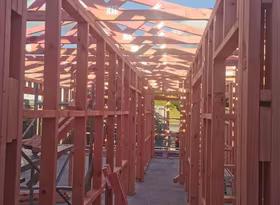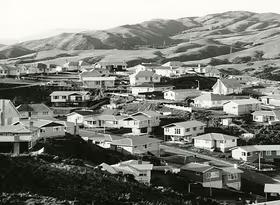Will Aucklanders embrace high density living?
New research by Infometrics shows that the affordability problems in Auckland’s housing market are not solely being caused by cyclical factors such as strong migration inflows and a lack of new house building over recent years. The median house price in Auckland is now equivalent to 11.3 years of average income in the region. But even a significant drop in Auckland house prices of 20% between 2016 and 2020 would still leave this ratio at 8.6 years, which would be highly unaffordable. Central and local government’s current efforts to boost the supply of new housing in Auckland will only go a small way to addressing the region’s housing crisis.
Infometrics Chief Forecaster Gareth Kiernan said “New Zealanders’ aspirations of the size of house they can own, and particularly the amount of land that comes with that house, are not realistically aligned with our actual incomes and wealth positions. Land prices are particularly critical in Auckland, and by clinging to the Kiwi dream that we should all be able to own our little piece of New Zealand, a significant proportion of society is effectively being priced out of the housing market.”
At a nationwide level, section prices rose from 27% of the average house price in 1984 to 55% by 2006. “Home buyers’ expectations need to be realigned to a greater acceptance of terraced housing and apartments as liveable options,” said Mr Kiernan. “The reality is that, in larger urban areas overseas, having your own private yard is simply not viable for most of the population. New Zealanders need to accept the need for a more intensive dwelling stock – both potential buyers, as well as existing property owners who can be resistant to more intensive housing developments in their neighbourhoods.”
The need for densification in Auckland has been well signalled by planners and policymakers. Infometrics believes it is important that high-density housing is built to a high quality, and that prices of units are not set at overinflated levels. The reputation of apartment living suffered during the building boom in the first half of last decade, with construction typified by small and low-quality units that were not really fit for purpose, which were then sold at high prices as developers aimed to make as much profit as possible in a relatively immature market.
The second area where Infometrics believes a change needs to take place in how the property market functions is to improve the attractiveness of renting as an accommodation option. Rental regulations that heavily favour landlords are a significant factor making renting a less appealing option than homeownership, while the absence of a comprehensive capital gains tax on property also boosts the attractiveness of homeownership compared to many other investment options.
“Leasing conditions in New Zealand are set up firmly in the favour of landlords and offer tenants little security of tenure. The structure of the rental market in New Zealand is in stark contrast to what can be seen across much of continental Europe,” said Mr Kiernan. “On average, people are now paying an additional $11,300 per year above the cost of renting to service their mortgage. Changes need to be made to reduce the perception of inferiority that renting has suffered in this country, including the introduction of regulations that encourage longer-term leasing arrangements.”
For more information, contact:
Gareth Kiernan 04 474 2147
021 119 3876






















